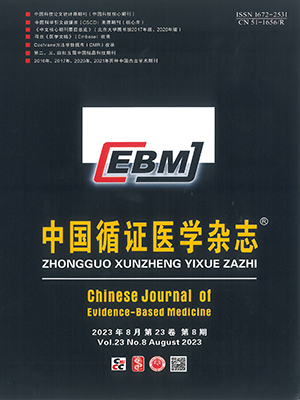| 1. |
Jemal A, Bray F, Center MM, et al. Global cancer statistics. CA Cancer J Clin, 2011, 61(2): 69-90.
|
| 2. |
Boonyaphiphat P, Thongsuksai P, Sriplung H, et al. Lifestyle habits and genetic susceptibility and the risk of esophageal cancer in the Thai population. Cancer Lett, 2002, 186(2): 193-199.
|
| 3. |
Li TF, Ren KW, Liu PF. Meta-analysis of epidermal growth factor polymorphisms and cancer risk: involving 9,779 cases and 15,932 controls. DNA Cell Biol, 2012, 31(4): 568-574.
|
| 4. |
Kasza A. IL-1 and EGF regulate expression of genes important in inflammation and cancer. Cytokine, 2013, 62(1): 22-33.
|
| 5. |
Lau J, Ioannidis JP, Schmid CH. Quantitative synthesis in systematic reviews. Ann Intern Med, 1997, 127(9): 820-826.
|
| 6. |
Mantel N, Haenszel W. Statistical aspects of the analysis of data from retrospective studies of disease. J Natl Cancer Inst, 1959, 22(4): 719-748.
|
| 7. |
DerSimonian R, Laird N. Meta-analysis in clinical trials. Control Clin Trials, 1986, 7(3): 177-188.
|
| 8. |
Begg CB, Mazumdar M. Operating characteristics of a rank correlation test for publication bias. Biometrics, 1994, 50(4): 1088-1101.
|
| 9. |
Egger M, Davey Smith G, Schneider M, et al. Bias in meta-analysis detected by a simple, graphical test. BMJ, 1997, 315(7109): 629-634.
|
| 10. |
Cheung WY, Zhai R, Kulke MH, et al. Epidermal growth factor A61G gene polymorphism, gastroesophageal reflux disease and esophageal adenocarcinoma risk. Carcinogenesis, 2009, 30(8): 1363-1367.
|
| 11. |
Cui L, Pan XM, Ma CF, et al. Association between epidermal growth factor polymorphism and esophageal squamous cell carcinoma susceptibility. Dig Dis Sci, 2010, 55(1): 40-45.
|
| 12. |
Lanuti M, Liu G, Goodwin JM, et al. A functional epidermal growth factor (EGF) polymorphism, EGF serum levels, and esophageal adenocarcinoma risk and outcome. Clin Cancer Res, 2008, 14(10): 3216-3222.
|
| 13. |
Menke V, Pot RG, Moons LM, et al. Functional single-nucleotide polymorphism of epidermal growth factor is associated with the development of Barrett’s esophagus and esophageal adenocarcinoma. J Hum Genet, 2012, 57(1): 26-32.
|
| 14. |
Upadhyay R, Jain M, Kumar S, et al. Interaction of EGFR 497Arg>Lys with EGF +61A>G polymorphism: modulation of risk in esophageal cancer. Oncol Res, 2008, 17(4): 167-174.
|
| 15. |
夏晴暉, 壽明霞, 陳岳明. 表皮生長因子G61A多態性與食管鱗狀細胞癌發生及其病理特征之間的關系. 中華實驗外科雜志, 2011, 28(12): 2229.
|
| 16. |
Lurje G, Leers JM, Pohl A, et al. Genetic variations in angiogenesis pathway genes predict tumor recurrence in localized adenocarcinoma of the esophagus. Ann Surg, 2010, 251(5): 857-864.
|
| 17. |
Jain M, Kumar S, Upadhyay R, et al. Influence of apoptosis (BCL2, FAS), cell cycle (CCND1) and growth factor (EGF, EGFR) genetic polymorphisms on survival outcome: an exploratory study in squamous cell esophageal cancer. Cancer Biol Ther, 2007, 6(10): 1553-1558.
|
| 18. |
唐巍峰, 孫斌, 顧海勇, 等. COX-2基因多態性與食管癌易感性關系的Meta分析. 中國循證醫學雜志, 2011, 11(12): 1391-1394.
|
| 19. |
Piao Y, Liu Z, Ding Z, et al. EGF +61A>G polymorphism and gastrointestinal cancer risk: a HuGE review and meta-analysis. Gene, 2013, 519(1): 26-33.
|
| 20. |
Zhang G, Zhang Q, Zhang Q, et al. Expression of nucleostemin, epidermal growth factor and epidermal growth factor receptor in human esophageal squamous cell carcinoma tissues. J Cancer Res Clin Oncol, 2010, 136(4): 587-594.
|
| 21. |
Boccia S, De Feo E, Galli P, et al. A systematic review evaluating the methodological aspects of meta-analyses of genetic association studies in cancer research. Eur J Epidemiol, 2010, 25(11): 765-775.
|




